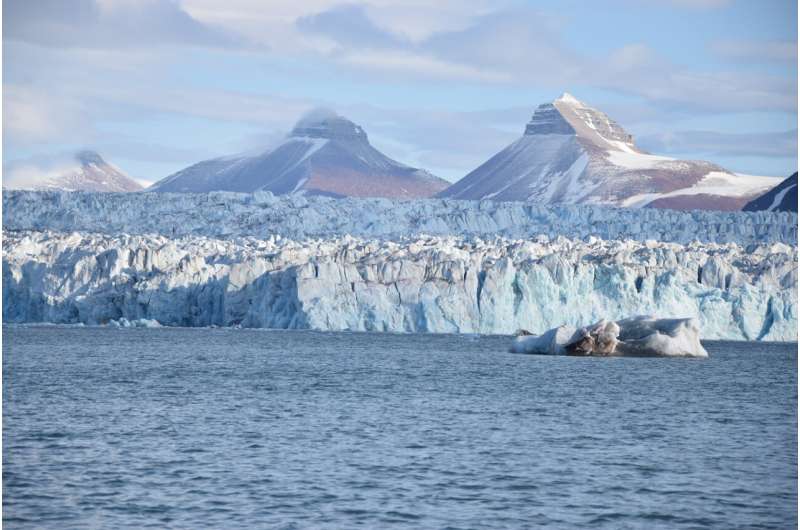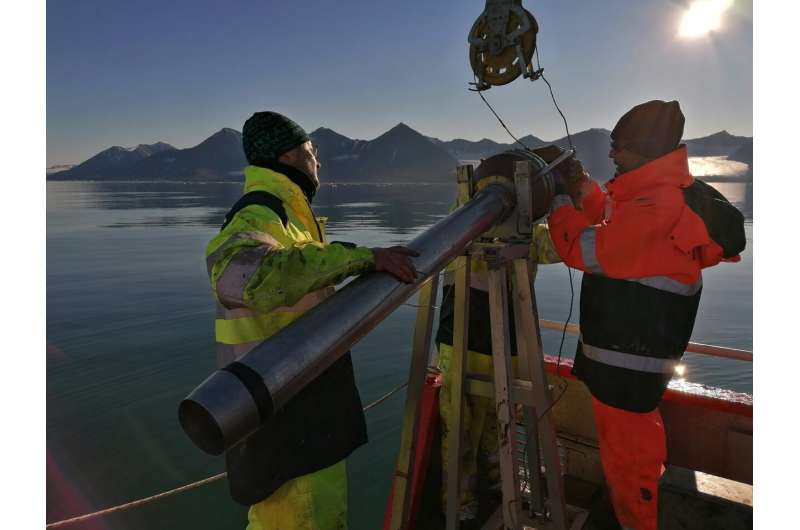In a recent paper, scientists expressed their surprise that the Arctic had started warming already back in the early 20th century, 100 years ago. This, along with the obligatory CO2 climate warming lip service, is described in a Cambridge University press release.
Hat-tip: Die kalte Sonne
==================================
Arctic Ocean started getting warmer decades earlier than we thought, study finds

An international group of researchers reconstructed the recent history of ocean warming at the gateway to the Arctic Ocean in a region called the Fram Strait, between Greenland and Svalbard, and found that the Arctic Ocean has been warming for much longer than earlier records have suggested. Credit: Sara Giansiracusa
Natural oceanic currents
The Arctic Ocean has been getting warmer since the beginning of the 20th century—decades earlier than records suggest—due to warmer water flowing into the delicate polar ecosystem from the Atlantic Ocean.
An international group of researchers reconstructed the recent history of ocean warming at the gateway to the Arctic Ocean in a region called the Fram Strait, between Greenland and Svalbard.
Atlantic waters flow into the Arctic
Using the chemical signatures found in marine microorganisms, the researchers found that the Arctic Ocean began warming rapidly at the beginning of the last century as warmer and saltier waters flowed in from the Atlantic—a phenomenon called Atlantification—and that this change likely preceeded the warming documented by modern instrumental measurements. Since 1900, the ocean temperature has risen by approximately 2 degrees Celsius, while sea ice has retreated and salinity has increased.
The results, reported in the journal Science Advances, provide the first historical perspective on Atlantification of the Arctic Ocean and reveal a connection with the North Atlantic that is much stronger than previously thought. The connection is capable of shaping Arctic climate variability, which could have important implications for sea-ice retreat and global sea level rise as the polar ice sheets continue to melt.
Atlantification is one of the causes of warming in the Arctic, however instrumental records capable of monitoring this process, such as satellites, only go back about 40 years.

Using the chemical signatures found in marine microorganisms, researchers have found that the Arctic Ocean began warming rapidly at the beginning of the last century as warmer and saltier waters flowed in from the Atlantic – a phenomenon called Atlantification. Credit: Sara Giansiracusa
The researchers used geochemical and ecological data from ocean sediments to reconstruct the change in water column properties over the past 800 years. They precisely dated sediments using a combination of methods and looked for diagnostic signs of Atlantification, like change in temperature and salinity.
“When we looked at the whole 800-year timescale, our temperature and salinity records look pretty constant,” said co-lead author Dr. Tesi Tommaso from the Institute of Polar Sciences of the National Research Council in Bologna. “But all of a sudden at the start of the 20th century, you get this marked change in temperature and salinity—it really sticks out.”
“The reason for this rapid Atlantification of at the gate of the Arctic Ocean is intriguing,” said Muschitiello. “We compared our results with the ocean circulation at lower latitudes and found there is a strong correlation with the slowdown of dense water formation in the Labrador Sea. In a future warming scenario, the deep circulation in this subpolar region is expected to further decrease because of the thawing of the Greenland ice sheet. Our results imply that we might expect further Arctic Atlantification in the future because of climate change.”
The researchers say that their results also expose a possible flaw in climate models, because they do not reproduce this early Atlantification at the beginning of the last century.
“Climate simulations generally do not reproduce this kind of warming in the Arctic Ocean, meaning there’s an incomplete understanding of the mechanisms driving Atlantification,” said Tommaso. “We rely on these simulations to project future climate change, but the lack of any signs of an early warming in the Arctic Ocean is a missing piece of the puzzle.”





This seems backwards:
“Our results imply that we might expect further Arctic Atlantification in the future because of climate change.”
I’ll try a re-write:
Even though we don’t know what is going on that causes Atlantification, we will assume it will continue and cause slight changes in weather in the Arctic region.
““Our results imply that we might expect further Arctic Atlantification in the future because of an alien invasion from outer space.””
Makes just as much sense that way…
[…] From the NoTricksZone […]
[…] From the NoTricksZone […]
[…] From the NoTricksZone […]
[…] From the NoTricksZone […]
[…] From NoTricksZone […]
[…] From the NoTricksZone […]
[…] From NoTricksZone […]
A paper by Hearty et al 2007 points to proxy data from the Caribbean that shows at the end of the previous Eemian interglacial, short warming peaks running counter to the general cooling trend toward glacial inception:
http://350.me.uk/TR/Hansen/GlobalSeauow045009.pdf
Are we currently also in a similar end-of-interglacial last gasp warming peak?
I remember a blogger called Arno Arrak who for many years was drawing attention to a big north Atlantic circulation rearrangement that happened early in the 20th century. It looks now like others have noticed.
Wonder how this reconstruction compares with Arctic sea ice extent records kept by whalers & Arctic explorers? In the v early 1900s, Amundsen sailed the Northwest Passage. In the 1890s, Nansen sailed much of the Arctic Ocean north of Russia.
The featured paper by Tesi et al is an Italian one based in Bologna, with individual authors also from Cambridge U.K., Norway and Germany. (It’s not a “Cambridge” study).
It’s incredibly interesting and important, showing a sharp transition to “Atlantification” at the turn of the 19th-20th century. It’s worth looking at the paper itself – not just the press release – and look at the figures.
https://www.science.org/doi/10.1126/sciadv.abj2946
A lot of oceanographic parameters are shown. Some start changing earlier, well back in the 18-19th centuries. Other parameters abruptly change at the start of the 20th century. A classic picture of transition in a complex system – the driving parameters and the responsive, state-flipping parameters.
It’s curious that during the whole 19th century, water temperature in the North Atlantic was higher at the depth of the LIA (little ice age). This might be surprising to some but shows that climate is ocean-adiabatic. The ocean’s colossal heat content cannot change that quickly, so a temperature change at one place means an opposite one somewhere else. Those who would expect a climate phenomenon like the LIA to show up in radiation balance changes at the top of atmosphere (TOA) would look there in vain. The heat never left the ocean.
[…] From the NoTricksZone […]
Once you get to the ice pack, you know it is the end of the line.
Silent film documenting a trip from Quebec to Baffin Island. Native peoples are shown dancing at the end of the film:
https://www.youtube.com/watch?v=qJo0ijHK720